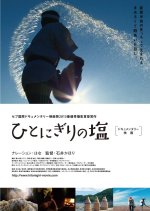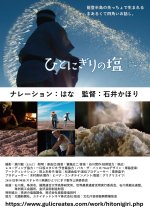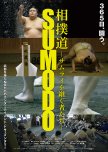A documentary that focuses on the craftspeople who continue to make salt with a technique called Agehama-shiki that has been passed down since ancient times, and the lush natural environment of the northernmost tip of the Noto Peninsula in Ishikawa Prefecture. It is also the feature-length debut of director Ishii Kaori. The process of making salt by collecting sea water and boiling it in a hiragama cauldron temporarily died out during the period of Japan’s rapid economic growth following World War II, but one family’s efforts to keep it alive has miraculously ensured its continuation. Salt is a vital element of people’s lives. The saltmaking artisans who perpetuate their traditions represent a way forward for those of us living in this modern age. (Source: Letterboxd) Edit Translation
- English
- Español
- Português (Brasil)
- 한국어
- Native Title: ひとにぎりの塩
- Also Known As: Hitonigiri no Shio
- Director: Ishii Kaori
- Genres: Documentary
Reviews

I really liked this documentary. The narrative gently leads the audience from the process they use on the peninsula to the history of why almost every family made salt there to why they stopped doing it -- and how it came to be preserved nevertheless. And then it looks into the present of 2011 and into the future of how this traditional method might be preserved and maybe even help the economic situation of this rural part of Japan.
I admit it, I had an elevated level of interest already because in my home town there also is a history of salt making (from briney springs rather than sea water), and in the very early days, before the invention of Gradierwerke, they also boiled the brine to produce salt crystals.
So, I had a connection already, but the documentary wouldn't have held my interest if not for these points:
* They built the narrative so that someone who has no prior knowledge can follow along. It takes time to explain and show the process, and also gives room for the beauty of salt and the landscape. Its slow pace also underlines how slow and back-breaking the labour was and is.
* They were probably lucky that there are not only photos but also film footage of the family who were the only ones to make salt for dacades. I'm glad we got to see this.
* There's a good balance between the facts of salt making and the people with their emotions and passion. Neither could exist without the other.
* Regarding people, after the revival of salt making (mostly for tourism), there are several endeavors to do so -- and I liked how the documentary doesn't try to push a "We're in this together, ganbarimasu!" type of narrative, because it clearly is not the case. The original family's father is very salty about how things went in recent years, and they don't try to hide that.
* I also liked how they found a random granny on the street, decided to interview her, and kept that footage in the documentary.
* The documentary also doesn't gloss over the fact that industrialization changed Noto, that salt making is not a craft with a bright future -- but that is more tourist-oriented now, trying to bring in money for the people who are left while preserving salt making as a historical artifact, and that this has changed salt making itself.
Was it good? -- Yes. It was informative, and engaging. It was also a bit slow, but I think that's perfect for the subject.
Did I like it? -- Very much so. I do have questions after watching it, but they are follow-up questions that would deepen my understanding, not questions because there was something missing or unclear.
Would I recommend it? -- Absolutely.
























